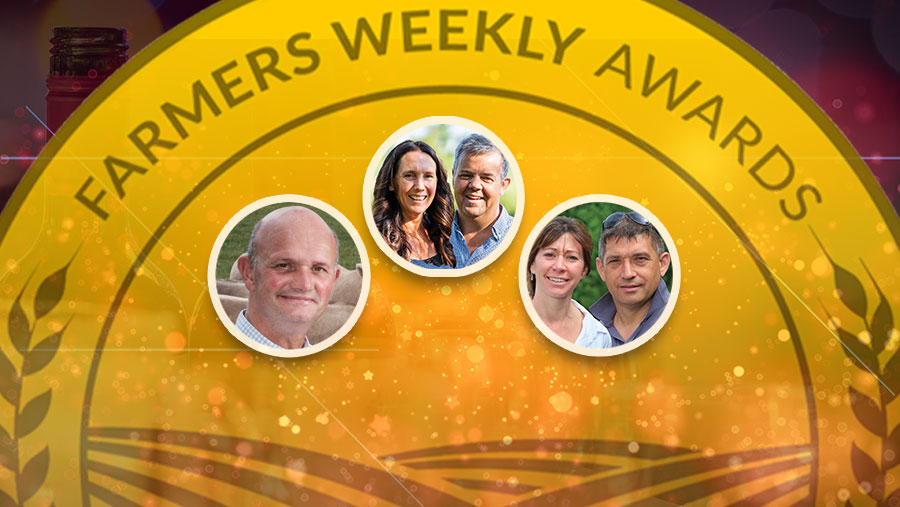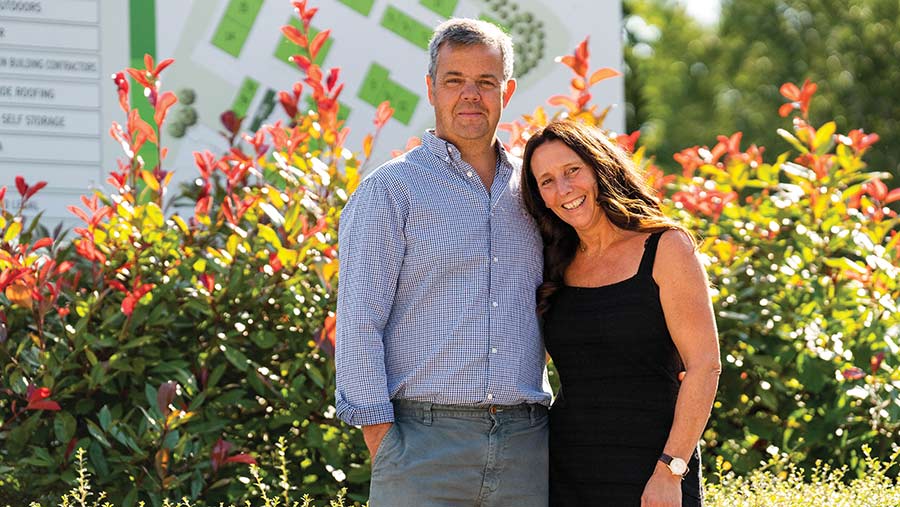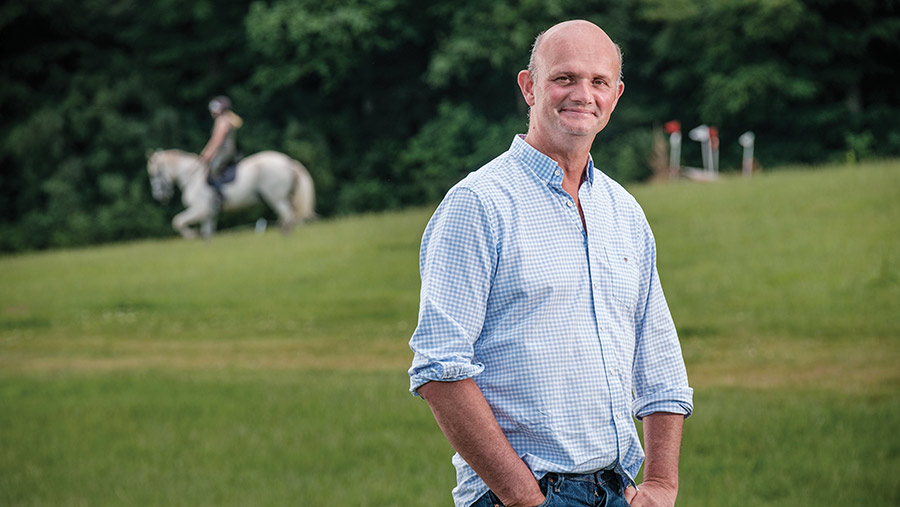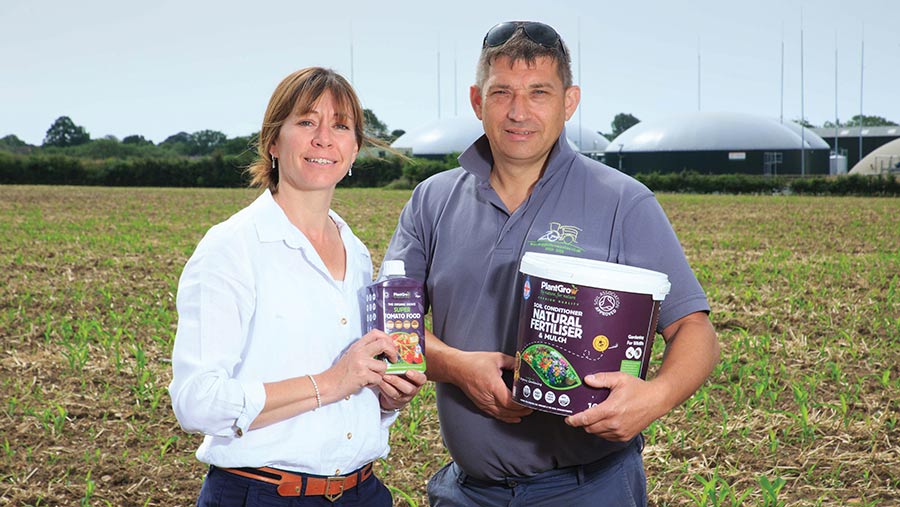Farmers Weekly Awards 2023: Diversification Farmer of the Year finalists
 Farmers Weekly Awards 2023 Diversification Farmer of the Year finalists
Farmers Weekly Awards 2023 Diversification Farmer of the Year finalists This year’s diversification finalists all share a strong entrepreneurial mindset which has allowed them to find ways to add value to their overall farming businesses through new opportunities and innovation.
See also: Nominate your 2023 Farming Champion
The finalists:
Johnny and Clare Clapp
Red Linhay, Devon
Philip Latham
Kelsall Hill Equestrian Centre, Cheshire
Steven and Sarah Suggitt
PlantGrow, Cakes Hill Barn, Norfolk
The Judges:
The judging team visited each of the finalists for a three-hour interview and tour of their farming enterprise.
Tim and Tanya Spittle
2022 Diversification Farmers of the Year
Charlie Reeve
Farmers Weekly business reporter
Nick Evans
Independent judge and Oxbury Bank co-founder and managing director
Johnny and Clare Clapp
Red Linhay, Devon

Johnny and Clare Clapp © Emily Fleur
Farm facts
- AD plant and ground source heat pump both generating electricity on farm
- Herd of pedigree Charolais cattle
- More than 1,000ha of land farmed in-house, plus further contract farming agreements
- Self-storage container business providing additional revenue
Farming operations
The farm business covers about 1,000ha of land, with about 500ha of this used to feed the anaerobic digestion (AD) plant and the rest split between combinable cereal crops and grassland for the beef enterprise. Additional land is contract-farmed by the business.
Digestate produced by the AD plant is spread onto the farmland by the arable contracting team, acting as an organic fertiliser and helping to improve soil health and productivity.
The contracting business employs about 10 staff, including a farm manager, a number of full-time and part-time workers, and two apprentices. More local farmworkers are often taken on during busy periods.
Clare runs the beef enterprise, rearing and selling pedigree Charolais bulls through the Cove Charolais herd.
Based near Tiverton in Devon, the farm first diversified by converting old agricultural buildings into a few commercial lets. This has since grown into a large business park, with a self-storage business and a range of tenants including kitchen showrooms, offices and a gym.
The main farm, now relocated just up the road, is home to the arable contracting business, a pedigree Charolais beef herd and a 1.1MW AD plant.
The farm has also invested in a ground source heat pump as a source of renewable energy and a straw pellet production line as part of a new venture.
Renewable energy
The farm’s AD plant provides a way to use crops grown on the farm and manure from the cattle to generate renewable energy. The plant produces biogas, which is then used to generate electricity and create a revenue stream.
Johnny says: “The AD plant, from a cashflow point of view, is the biggest earner, whereas the business park offers a good return, but is quite high-investment.”
The new ground source heat pump will also create renewable energy and is being used to provide heat for drying in sheds and to heat water on farm.
One of the other diversified enterprises which benefits from the heat pump is a straw pelleting business.
Wheat straw harvested by the arable business is dried and turned into pellets. These are then sold in bulk to the pet industry for use as cat litter, with the products being sold in bags by a number of major supermarkets.
Business Park
The business park, which operates as Hartnoll Business Centre, was the location of the original farm and has since been developed into a number of commercial properties let out for use as light industrial, office and retail units. There are also a small number of residential lets on site.
The out-of-town location, with good road links to the M5, has helped the business park to become a success, with many tenants relocating out of Tiverton.
A self-storage business with about 100 containers is also located at the business park, with a second storage site near Exeter.
The storage business is run in-house and provides a consistent income stream for the wider business. Demand is reportedly strong with a waiting list of individuals interested in renting units.
What the judges say
Johnny and Clare have built up a whole portfolio of diversification enterprises, including a business park and AD plant, while also operating a highly successful arable and beef farming business.
Johnny and Clare Clapp summary
The numbers
- 1.1 Megawatt AD plant
- 1,000 Hectares of land farmed in-house
- 500 Hectares used to supply the AD plant
- 10 Workers employed as part of the farming business
- 100 Self-storage containers let out at the business park
The judges liked
- Great integration between farm and diversified enterprises
- Entrepreneurial outlook
- Good time and people management
- High quality beef enterprise with great pedigree bulls being produced
- New market opportunities for straw pelleting business
Philip Latham
Kelsall Hill Equestrian Centre, Cheshire

Philip Latham © Jim Varney
Farm facts
- First equestrian venture was an annual farm ride in 2004
- Cattle split over two farms with the milking herd at one site and dry stock at a second
- Commercial and residential lets
- Course designed by Captain Mark Phillips
Farming operations
The dairy business operates across two farms with a milking herd of about 500 cows at Brook House Farm and both youngstock and dry cows at Organsdale Farm, alongside the equestrian centre.
Some heifers are outwintered and zero-graze the grass off the cross-country courses and dressage areas to reduce waste in the spring.
Youngstock graze the fields used for cross-country throughout the year, which reduces the need for mowing.
The farm also grows maize and fodder beet. The maize is followed in the rotation by Italian ryegrass which helps provide clean maize and weed-free short-term grass leys.
A haylage enterprise has created an additional source of revenue, with the equestrian centre providing a high number of customers.
Haylage is cut and packed into small bales on site, then sold through Kelsall Hill Feeds and direct to customers.
Philip says: “We developed a haylage offer to serve our livery customers and mop up surplus grass, giving us greater resilience in dry years for the dairy and a cash crop to harvest without the need for indoor storage.”
Steak sandwiches are currently being trialled in the cafe using beef from culled dairy cows, and there is also some interest in supplying the cafe with milk from the dairy.
The business has two holiday cottages and is looking to increasing its offering for competitors wanting to camp on site.
Kelsall Hill Equestrian Centre has expanded from an annual farm ride around the dairy farm in 2004 to a large-scale multifunctional venue with indoor and outdoor arenas, a livery yard and an eventing course capable of hosting high-level international equine events.
A number of commercial lets and business units are based at the equestrian centre and let out to tenants, with many of these being connected to the industry, such as a saddlery and equine physio.
There is also an onsite cafe which is run as part of the wider business, and function rooms available for hire.
Equestrian centre
Kelsall Hill Equestrian Centre includes two indoor arenas, several outdoor areas, a cross-country schooling field and a 4.5-furlong all-weather gallop.
The centre runs affiliated horse trials for British Eventing and has previously worked with Captain Mark Phillips as its course designer. It hosts about 30,000 competitors a year.
There is a large livery yard with 110 stables rented out, and a 6.5-mile ride around the edge of the farm.
Kelsall Hill has a large social media following with almost 20,000 likes on Facebook and more than 7,000 followers on Instagram.
A team of three office staff typically works each day, on a four days on and four days off rota.
In total, about 100 people are employed on the site through all the different businesses.
Other ventures
There a 15 commercial business units based on the site including furniture showrooms and equine businesses.
The Urchins Kitchen Cafe benefits from the high footfall to other businesses, as well as providing catering during events.
Dog shows and demonstrations have also taken place on site using the various facilities.
The business has two holiday cottages and is looking to increasing its offering for competitors wanting to camp on-site.
The judges say
Philip has created a truly state-of-the-art equestrian facility and venue at Kelsall Hill which is able to provide a good source of income while also linking with the existing dairy enterprise.
Philip Latham summary
The numbers
- 400 Total farm size in hectares
- 110 Number of stables on site for livery
- 500 Size of milking dairy herd
- 30,000 Number of equestrian competitors each year
- 100 Total number of people employed on site through different businesses
The judges liked
- Haylage business capitalising on equestrian market
- Clear vision for each business
- Business resilience expanding and investing during Covid-19
- Standard of equestrian centre and calibre of competitions taking place
- Grazing of youngstock on site to reduce costs
Steven and Sarah Suggitt
PlantGrow, Cakes Hill Barn, Attleborough, Norfolk

Steven and Sarah Suggitt © Tim Scrivener
Farm facts
- Foraging contracting business supplying AD plants
- PlantGrow business formed from sales of digestate
- Range approved by the Soil Association
- Working with a number of AD plants to produce the products
- Selling in bulk, through retailers, and direct to consumers
The PlantGrow business has developed out of a useful byproduct produced by the farm. Steven and Sarah were early adopters of biogas production in the UK and first fed electricity into the grid using an anaerobic digester (AD) in 2013.
After trialling digestate from an AD plant on some of their fields, they found it was helping to increase yields by up to 20% and the farm business managed to reduce its artificial fertiliser bill by £150,000.
This is where the idea of producing an organic fertiliser-based product came from, before they expanded into the horticultural sector through the PlantGrow brand.
Farming operations
First-generation farmers Steven and Sarah started out more than 20 years ago with a farm contracting business which offered services to livestock farmers such as mucking out sheds, spreading muck and supplying straw.
For a number of years the couple also operated a bed and breakfast-style pig unit for more than 10,000 pigs, before buying a forage harvesting business in 2009 and making this the main enterprise.
The agricultural contracting business today trades as Suggitt Farm Services, contracting more than 1,000ha and providing services such as straw baling, muckspreading and foraging.
Suggitt Farm Services and PlantGrow between them have 15 employees.
The contracting team carts crops to several local AD plants and takes digestate from the AD plants to spread on their land. They also provide this service for other local farmers.
PlantGrow
Steven’s brother Daniel Suggit was brought into the company in 2016 to help design the PlantGrow brand and build up a range of smaller products suitable for the horticulture industry.
PlantGrow now sells a range of peat-free compost bags, organic fertiliser tubs and bottled products designed for sale in garden centres and supermarkets.
A patent was awarded to the business in 2020 for the process of producing fertiliser products through the use of anaerobic digestion.
The product range is advertised as organic and peat free, and is approved by the Soil Association.
As well selling at retail under the PlantGrow name, the business sells bulk loads of the organic compost to some of the largest industry players for use in their own ranges.
Due to demand, PlantGrow now sources the digestate to produce the product from a number of AD plants.
Steven says: “There is an abundance of digestate out there so we can keep spreading the PlantGrow message and PlantGrow name.”
The AD plants are all fed the same rations of feed, with the blend being key in making sure a consistent end product is created.
“It is all regularly tested to make sure our customers get a very consistent product,” he adds.
The PlantGrow range is currently packaged by an external company and then stored and distributed through PlantGrow’s own distribution facility.
As the company expands and volumes increase, there are plans to invest in its own packaging facility.
PlantGrow now has partners licensed across the UK, following the same procedures to make the product.
Marketing
The company has taken on a marketing director to work alongside Daniel in promoting the brand.
PlantGrow uses a mixture of social media advertising, Google advertising and email marketing.
The company recently launched its first television advert with a reach of more than 12 million people, and has also trialled radio campaigns.
What the judges say
Alongside their foraging and farm contracting business, Steven and Sarah have created a plethora of compost and fertiliser products under the PlantGrow brand, with major scope for growth within the horticultural market.
Steven and Sarah Suggitt summary
The numbers
- 20 Percentage increase in yields after applying digestate on land
- 1,000 Area of land in hectares covered by contracting business
- 15 Number of employees across both enterprises
- 12 million Reach from television campaign
- £150,000 Business saving from removal of artificial fertilisers
The judges liked
- Use of digestate byproduct
- PlantGrow Brand
- Patent being granted
- Future potential growth of the business within the horticultural sector
- Marketing of the product range

